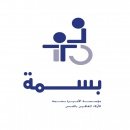Consultant/Situation Analysis for Girls with Disabilities
الوصف الوظيفي
لقد انتهت صلاحية هذه الوظيفة في 2017-11-30
تصفح أحدث الوظائف
عند التقدم لاية وظيفة عن طريق الانترنت، لا تقم بإعطاء معلومات بطاقة الأعتماد او أية معلومات بنكية / مالية لصاحب عمل. نصيحة من جوبس لحمايتك :
آخر الوظائف المعلنة بواسطة
The Jerusalem Princess Basma Centre
المسمى الوظيفي
تاريخ النشر









